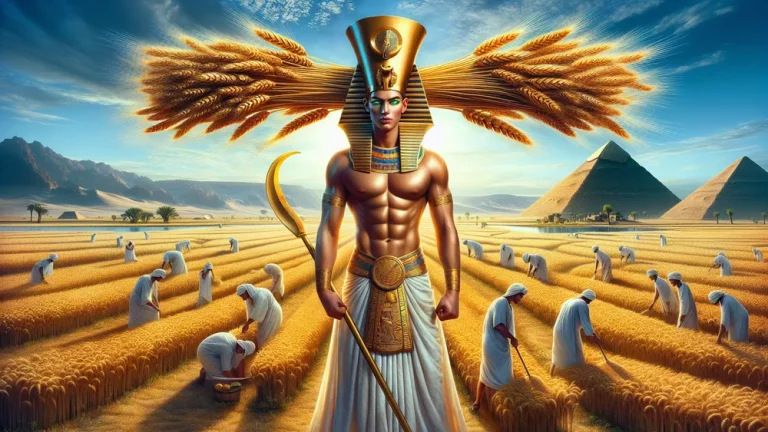Glaucus: Greek Sea-God Transforming From Mortal Fisherman
In the expansive and detailed world of Greek stories, Glaucus is a quite interesting person who connects the human and godly worlds with his amazing change from a simple fisherman to a respected ocean god. This story, like many Greek ones, has differences, meaning the rich and complex storytelling style of ancient Greece.
Key Points:
- Glaucus started as a fisherman in Boeotia before becoming a sea god after eating a magical herb.
- The herb transformed him, giving him godly features and linking him to the sea’s divine world.
- He connects with major sea gods, gaining wisdom and a place among them, while becoming a guide for sailors.
- Glaucus possessed powers such as prophecy, immortality, and control over the sea, aiding and watching over fishermen.
- In myths, he meets the Argonauts, showing his role as a divine helper in human quests.
- He also pursues love with Scylla, facing rejection and tragic consequences due to Circe’s involvement.
- Glaucus’ story and symbols, like fish and seaweed, mean his control over the sea, with enduring impact in art and culture.
As you start this look into Glaucus’ story, think about the Greek beaches where his life starts, full of sea animals, much like busy beach towns now where fishermen work each day. His story isn’t just about a change caused by gods but also means deeper ideas of change and finding one’s path, like the thinking found in Greek stories.
This beginning will lead you into the myth of Glaucus, setting up for a deeper look into his start, change, and importance as an ocean god in the old Greek gods group.
Glaucus: Overview and Key Facts
| Key Aspect | Description |
|---|---|
| Origin | Started as a regular fisherman from Boeotia, known for his strong tie with the sea. |
| Transformation | Became a sea god after eating a strange herb that made a big change, a typical story where gods change human fate. |
| Role in Myths | Seen as a helper of sailors and fishermen, showing ideas of change and dealing with fate. |
| Key Links | Connected with major sea gods like Oceanus and Tethys, which helped him fit into the world of sea gods. |
| Symbols | Usually has features of sea life, like fish scales or seaweed hair, meaning his link to the ocean gods. |
| Famous Stories | Stories about him include the Argonauts and a sad love story with the nymph Scylla, showing his godly powers and human-like feelings. |
| Cultural Impact | Shown in different artistic pieces across ancient Greece, proving his importance in art, writing, and religious life. |
| Worship | Seen as a local god by seaside places, likely involved in sailors’ rituals and gifts for safe travel on the ocean. |
Where Glaucus Came From
To really get Glaucus’ change and his later life in Greek stories, it’s important to explore the early part of his life as a fisherman and the big effect of his meeting the magical herb.
When Glaucus Was Just a Fisherman
Long before folks knew him as a sea god, Glaucus lived a simple life fishing along the Boeotia coast, forming a close bond with the sea and the plenty of fish it provided. Like today’s small-scale fishermen, he cast his nets to catch sea bounty, supporting himself from what he found in the water.
This simple beginning is a common start in Greek stories, where regular people often face big realizations or changes. Some stories say Glaucus was drawn to the beauty and mystery of marine creatures, which hinted at his later change. In other tales, this love for the ocean paved the way for his move to the gods’ world, showing how Greek stories blend mortal and divine through major events of destiny.

Glaucus, a fisherman once living by the Boeotia coast, was deeply connected to the sea and its mysteries, leading him toward becoming a sea god in dramatic tales blending human and divine transformations.
What Changed Everything
Glaucus’ life suddenly changed when he found a mysterious herb near his fishing spot. Tales say he saw the fish he put on the grass jump back into the sea, which led him to eat the herb too. This act means a magical event in Greek myths, like finding a rare chance that changes one’s path completely.
When Glaucus ate this plant, he got god-like traits, looking more like a sea creature, as if this plant made a link between human and godly worlds.
Though some stories suggest other reasons for his change, like gods helping directly or a planned path because of his love for the sea, the herb is the most acknowledged cause of transformation, showing its power in Greek stories.
Becoming a Sea God: The Transformation
With this magical herb as a trigger, Glaucus started a new life stage, and this began his path into the godly world of sea gods.
Meeting the Gods of the Sea
After his transformation, Glaucus was brought into the watery place of sea gods, and his welcome in stories is seen as key to his new identity. His talks with Oceanus, the titan who stands for the world-ocean, appear important as they confirmed his spot within the sea’s godly group.
Oceanus and Tethys, his partner, showed the caring and wide reach of the sea and they guided Glaucus while he got used to his new job. This change is like joining a top group or community, where mentors help navigate new duties. With the help from these gods, Glaucus gained both godly friends and the wisdom of those ruling the sea. In Greek stories, such meetings mean big changes are possible.
When encountering other key sea gods, Glaucus likely felt he belonged in the vast and awe-inspiring sea world. When these gods recognized him, it not only confirmed his change but gave him the power and respect linked with being a god. Different stories suggest these gods gave Glaucus special knowledge or extra powers, preparing him well for his tasks.
For those new to myths, these godly talks explain how important divine rank and friendships are in shaping the life of new gods within the Greek pantheon.
What Glaucus Could Do and Where He Ruled
Now as a new sea god, Glaucus was given many powers and watched over a specific sea area. The powers he had in different stories show his high place among the gods. He could:

- Prophecy: Glaucus had the skill to see future events. This helped him guide sailors and others with useful information.
- Immortality: He lived forever, like other gods, not limited by the human life he had as a fisherman.
- Control over the sea: He could manage the ocean’s movements and life, which shows his strong bond with the sea.
Even though myths change on how much power he had, Glaucus is often seen as a protector for sailors and fishermen, covering parts of the Aegean Sea. This role is like a watcher who looks over a group, offering safety and tips against the wild sea.
These stories remind us that Greek gods had super skills and roles in nature and people’s lives, teaching protection and planning.
Getting Used to the God Life
Going from being a regular fisherman to a sea god was a big job for Glaucus. He needed to get used to living like a god, which meant big changes. Like starting a new job with different skills needed, he had to learn the details of his powers and what he needed to do now that he was higher in rank.
He was joining other sea gods and living a life focused on immortality and important tasks instead of human worries. Some stories tell of him accepting the role of looking out for sailors by giving them advice and seeing future events. It was a big change.
This process is like taking on a community job where you balance new power with helping others, showing the two sides of living like a god – personal growth and always looking after others in the godly world.
Glaucus had to adjust to the big changes of becoming a sea god, focusing on learning his powers and new responsibilities while guiding sailors and balancing personal growth with helping others.
Stories and Tales About Glaucus
When Glaucus got used to his new identity and the things he had to do, many famous stories started to come out. These stories created the picture of his mythological existence and how he dealt with others.
Glaucus Meets the Argonauts
In Greek myths, when Glaucus met the Argonauts, it was an interesting meeting of stories, mixing godly help with the adventure of Jason and his group. As told in Apollonius of Rhodes’ “Argonautica,” this happened during a critical time on their trip to get the Golden Fleece. The Argonauts, because they lost their leader, Tiphys, to sickness, felt stuck and lost.
Then Glaucus came out of the sea and gave them advice and support, acting like a strategic helper one might consult for advice. His presence made the Argonauts feel sure of godly help, and it influenced their future plans. Glaucus’ help highlighted his role as a protector and guide, giving sailors knowledge about the sea’s mysterious ways.
With his insight, Glaucus showed how sea gods can directly impact human work, resonating with the bigger tradition of gods stepping into heroic stories to change what happens. In the story, Glaucus did more than just guide by telling the Argonauts to make Ancaeus their new leader, ensuring their journey continued.
For new readers, this points out the important place of gods not only in supporting people but also affecting key choices. The meeting with Glaucus added to the story of the Argonauts, embedding interactions between humans and gods. Different stories about this myth indicate divine help could vary – either subtly influencing from the background or directly helping, like Glaucus did.
This meeting draws attention to the role of divine influence on luck and destiny in Greek myths, where gods like Glaucus acted as guides and caretakers. By learning about this interaction, readers can better appreciate the story’s complexity and the cultural role of gods shaping people’s stories in ancient Greek mythology.
Glaucus and Scylla: A Love Story
The love between Glaucus and the nymph Scylla is a story filled with sadness and change, touching on themes that remain relevant. In Ovid’s “Metamorphoses,” Glaucus, in love with Scylla’s beauty, tries to win her love. But his new look, as a merman after his change, scares the nymph, and she runs from him.
In these myths, unreturned love means a reminder of the difficult feelings even gods must face. For many people, Glaucus’ situation can be seen as dealing with the challenge of getting past first looks to show who you really are, a theme both old myths and today’s love tales know well.
To win Scylla’s love, he decided to ask the sorceress Circe for help, known for her knowledge of potions and changes. But the story takes a turn, Circe falls for Glaucus and, when he rejects her, turns her jealousy into a curse on Scylla.
This curse changes Scylla into a weird creature living in the straits by Charybdis, changing her life forever and making their love impossible. This story mixes jealousy and unfulfilled wants, meaning how feelings can have lasting effects. By seeing what happens between Glaucus, Scylla, and Circe, readers can understand the layers of myth stories, where what gods and people do are closely tied by choices and fate.
Signs and Symbols of Glaucus
In Greek myths, certain symbols are linked to Glaucus. They mean parts of his change and what he controls. These symbols are used to identify him and mean his role and power in myths. For instance, just as an anchor can mean safety in a rough sea, the symbols of Glaucus show his control over the water and its dwellers. Below are some symbols tied to Glaucus:

- Fish: He was turned into a god when he changed from a mortal fisherman. Fish mean his sea powers and control over marine life.
- Seaweed: This means the magic plant that started his change, focusing on change and godly help.
- Merman Form: Seen with a merman’s body, this means his mix of human life and godly sea life, just like a merman links the land and water worlds.
By seeing these symbols, you can understand how old Greeks saw Glaucus’ powers and area of control, showing him as a divine protector of the sea.
Glaucus’ Impact on Greek Life
Outside his myth story and symbols, Glaucus’ influence reaches many parts of Greek culture, which means impact on art, worship, and literature.
Glaucus in Art
Throughout history, artists have shown Glaucus in many ways. They show how he changed from a human to a god with a big focus on his fish-like body. In old Greek pots and statues, Glaucus is often seen with a fish’s tail, which means he is like other sea gods such as Poseidon. Yet, he is different because of his story about change and mystery.
Greeks often put him in ocean pictures, meaning his control over water. He also links to classic images of the underworld, where such figures mean themes of change and otherworldly help. By understanding these images, you can see Glaucus not only as a small sea god but as a lasting sign of the ocean’s power.
Glaucus and Worship
Glaucus was not a main god in the Greek god-group. However, evidence means he held an essential spot with seaside groups. They respected him as a protector of sailors and fishermen. This tie to sea life is like how today some believe holy figures keep travelers and seamen safe, giving comfort in dangerous waters.
Some say sea people might have held small rituals and told prayers to Glaucus for safe trips, especially when storms made sea travel risky and godly help seemed needed. Simple offerings of the sea like fish, shells, or made tokens might have been left at small shrines or special places by the sea.
So, the respect for Glaucus means the need for balance with the hard-to-control and sometimes wild ocean, showing people’s long respect for gods who balanced nature.

Glaucus, revered by seaside folks as a protector of sailors and fishermen, had special rituals and offerings, demonstrating people’s respect for him and their desire for safety on unpredictable seas.
Glaucus in Old Writings
In Greek myths, Glaucus is an interesting character with stories saved in many old writings. The poem by Ovid, called “Metamorphoses,” includes his story about change and godly help. In addition, other mentions of Glaucus appear in writings by Pausanias, who was a Greek traveler and mapmaker. He gives a view of local myths and practices tied to this sea god.
Also, in literary talks, Glaucus has been named by the poet Hesiod, who names him with other sea gods, but details are few and different across texts.
This mixed yet constant presence in old writings means his role as a sea sign and the careful nature of myths, where a character’s importance ranges from small mentions to big parts of change stories. When you read these old works, you also discover how Glaucus’ stories about mystery and gods, while not well-known now, were liked by old audiences who enjoyed stories about mystery and gods.
Pantheon of Ancient Greek Mythological Figures
Glaucus is in the complex collection of Greek myths. He belongs to a group that’s complex with gods, heroes, and legendary creatures, each with specific roles and areas. Unlike big gods like Zeus or Poseidon, who are major in stories, Glaucus is a small sea god. However, he means transformative power of the ocean. His existence is tightly linked to other sea gods.
But he often appears as a mixed figure with human and water features. This role means the variety and complex ranking of Greek myth characters, which can be a lot. For those interested in a full list of Greek mythological heroes and figures, you can use resources to explore all Greek Mythological Heroes And Figures.
FAQs
1. Who was Glaucus in Greek mythology?
In Greek mythology, Glaucus was a mortal fisherman who transformed into a sea god after consuming a magical herb.
2. How did Glaucus become a sea god?
How Glaucus became a sea god was through consuming a magical herb on the seashore that instigated his transformation from a mortal fisherman into a divine being.
3. What is the story of Glaucus and Scylla?
The story of Glaucus and Scylla centers on Glaucus’ unrequited love for the nymph Scylla, which tragically led to her transformation into a monstrous creature after she rejected him and he sought a love potion from the sorceress Circe.
4. What were Glaucus’ powers as a sea god?
Glaucus’ powers as a sea god included the ability to predict storms and calm the seas, shape-shift, and bestow prophecy.






